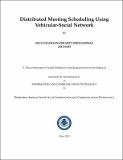Please use this identifier to cite or link to this item:
http://drsr.daiict.ac.in//handle/123456789/566| Title: | Distributed meeting scheduling using vehicular-social network |
| Authors: | Srivastava, Sanjay Mulchandani, Bharti Dholoomal |
| Keywords: | Vehicular-social network Vehicular Ad-hoc networks Vehicular Ad-hoc networks Safety measures |
| Issue Date: | 2015 |
| Publisher: | Dhirubhai Ambani Institute of Information and Communication Technology |
| Citation: | Mulchandani, Bharti Dholoomal (2015). Distributed meeting scheduling using vehicular-social network. Dhirubhai Ambani Institute of Information and Communication Technology, viii, 39 p. (Acc.No: T00529) |
| Abstract: | The importance of vehicular communication and intelligent transportation systems is increasing manifold these days; especially due to the fast growing support technologies. Social networking is also an emerging system that is being highly adopted by users. Encompassing social network into vehicular network opens up many services beyond on-road safety that are user oriented. A wide range of applications can be built using this hybrid vehicular and social network. We have designed one such application - distributed meeting scheduling, which will allow combining the two heterogeneous environments and communication among vehicles, infrastructure, social network users. This application has potential usage when there is a large group of users who aim to schedule a meeting with other group members but the quorum and number of essential participants requirements are low compared to the number of invitees in the meeting. A social model guarantees efficient routing of messages in the network even if the number of nodes become orders of magnitude higher than what a traditional internet handles. Also, the application allows users to reschedule on the go by detecting if any of the attendees is getting late to reach the destination using the vehicular network. We have designed an algorithm for this meeting scheduling application which takes users’ preferences and constraints as input and attempts to schedule the maximum number of meetings and ensures total time taken to schedule any meeting is as low as possible. We have created our own simulator in java to measure the performance of algorithm and observed that there is a trade-off between total confirmed meetings and time taken to schedule a meeting, this time taken is directly proportional to the number of users offline i.e. when more users go offline, the time taken to schedule meetings also increases. |
| URI: | http://drsr.daiict.ac.in/handle/123456789/566 |
| Appears in Collections: | M Tech Dissertations |
Files in This Item:
| File | Description | Size | Format | |
|---|---|---|---|---|
| 201311035.pdf Restricted Access | 602.78 kB | Adobe PDF |  View/Open Request a copy |
Items in DSpace are protected by copyright, with all rights reserved, unless otherwise indicated.
